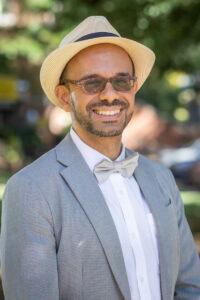New faculty Q&A: Alessandro Moscaritolo Palacio

Alessandro Moscaritolo Palacio likes to joke that he wasn’t very popular as a student in the economics department at the Universidad Central de Venezuela.
“I am a curious individual, and I enjoy questioning things, which the economists with whom I interacted at the time accepted without questioning,” he explained. “I was frequently complaining that economic theories greatly oversimplified the target phenomena, and many of my professors and classmates hated me for that.”
Moscaritolo Palacio, who joined Randolph this fall as an assistant professor of comparative philosophy, eventually decided to channel that questioning nature into a new field.
He earned his undergraduate degree in philosophy and his master’s in logic and philosophy of science at the Universidad Central de Venezuela, as well as a master’s degree and PhD in philosophy from the University of Illinois Chicago.
Before coming to Randolph, he was a visiting assistant professor of philosophy and the Chauncey S. Truax Postdoctoral Fellow in Philosophy at Hamilton College in New York.
A historian of Western philosophy, his research and teaching interests include the philosophy of education and the philosophy of art, as well as the ethics and marginalized philosophies of the Americas.
What interested you in philosophy and why did you want to pursue it as a career?
I am a curious and inquisitive individual; whether this is a blessing, or a curse, is still genuinely unclear to me. When I resumed my philosophy studies, I wasn’t even sure that I wanted to become a professional philosopher; I merely knew that thinking, for hours on end, was one of my favorite activities.
As often happens in life, I came to love academic philosophy gradually. In all honesty, it was not love at first sight (or even at second sight). I came to love philosophy as I noticed its salutary effects on my intellectual and emotional well-being. The critical thinking skills that one develops by studying philosophy in a systematic manner empowered me to live a life which, on the whole, has been good; I am certain that I would have been quite wretched had I not followed this path. In hindsight, I believe that studying philosophy is one of the wisest choices I have made, second only to marrying Luis, my husband of 10 years.
What attracted you to the job here at Randolph?
As a postdoctoral fellow at another small liberal arts college, I came to realize that this type of institution of higher learning is the ideal working environment for me: I greatly value the sense of tight-knit academic community that is part of the ethos of Randolph.
Equally importantly, Randolph’s unique Department of Comparative Philosophy immediately caught my attention. As someone who believes that conversation, both in academia and elsewhere, makes progress possible, I wanted to be part of a department expressly devoted to bringing diverse traditions and approaches into a fruitful dialogue. Last but not least, as someone for whom teaching is a calling, I am delighted to be part of an institution that values teaching (and serving students) as much as I do.
Describe your teaching style. What can students expect in your classes?
I believe that one (or the) main goal of a philosophy class is to empower students to become fully autonomous learners and thinkers. To that end, I invite all my students to co-lead each class meeting with me. From a pedagogical standpoint, the guiding theme of my courses is to create a learner-centered experience.
For instance, in most of my courses I do not give my students a traditional course schedule, i.e., one that lists the activities we will complete in each class meeting. Instead, I merely provide participants with a reading list, which we as a group can continuously revise. We may choose to skip certain texts or add others, or we may choose to spend multiple classes examining a single text.
And because the main goal of all my classes is to empower participants to do philosophy, I keep lecturing to a bare minimum. Generally speaking, I am less interested in teaching my students certain content than I am in empowering my students to acquire or hone the skills that one can acquire only by taking responsibility for making certain assertions, as well as by rigorously examining the assertions made by others.
What are your initial impressions of Randolph and its students?
I have very fond memories of my first visit to Randolph, last February, as a finalist for the position I currently hold. In addition to the understated elegance of the buildings and the imposing beauty of the surrounding mountains, I was impressed by the friendliness of everybody I met on campus. From the students who joined me for lunch, as well as those who attended my teaching demonstration later that day, to the members of the faculty and the administration with whom I had delightful conversations.
Over the last month, I have interacted with many intelligent young people. I have encountered many young minds who hold views that deserve to be taken seriously; young people who can make meaningful contributions to the world. I feel privileged to be part of their intellectual and personal development, and I hope I can empower them, however modestly, to be the best version of themselves.
What do you like to do outside of the classroom as far as hobbies or other activities?
My husband and I are proud parents of a 7-year-old mixed Russian Blue cat, and serving Her Feline Majesty is a most demanding endeavor! In what little spare time she graciously grants us, we enjoy visiting art museums, attending concerts and recitals, and finding vegan (or vegan-friendly) restaurants. Equally importantly, we greatly enjoy participating in various community-based service activities.
Tags: Alessandro Moscaritolo Palacio, comparative philosophy, faculty, new faculty 2024
